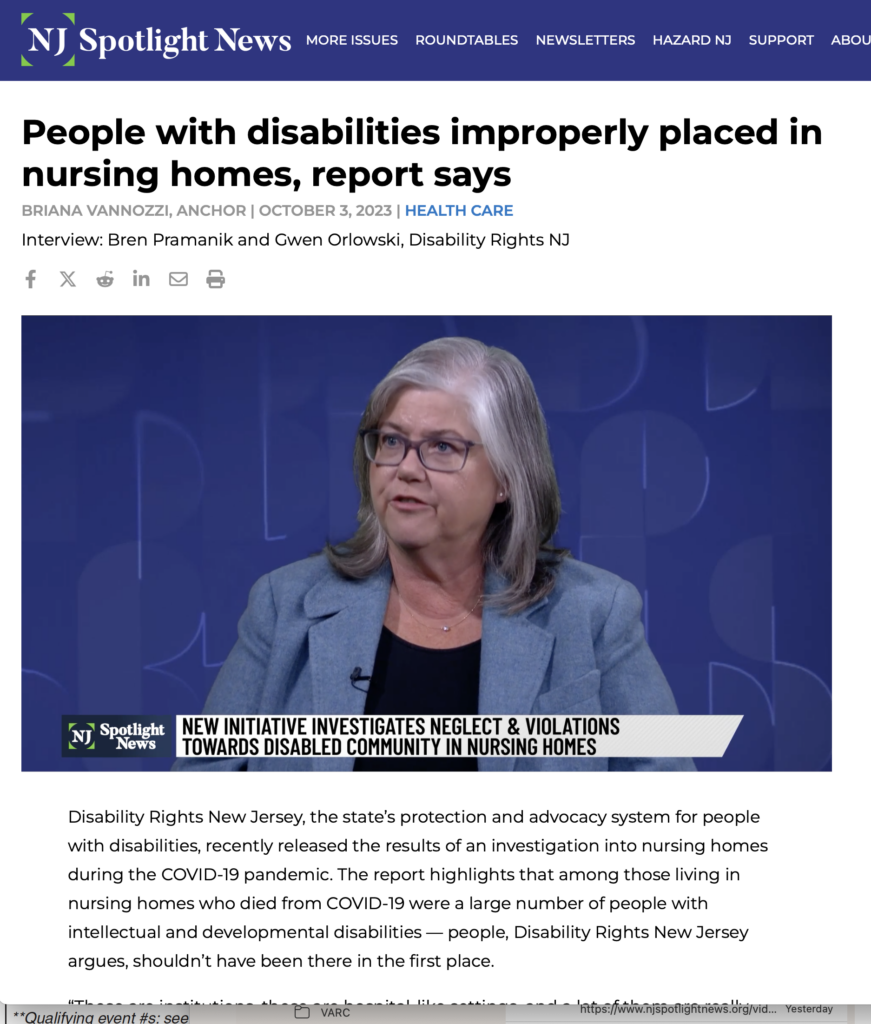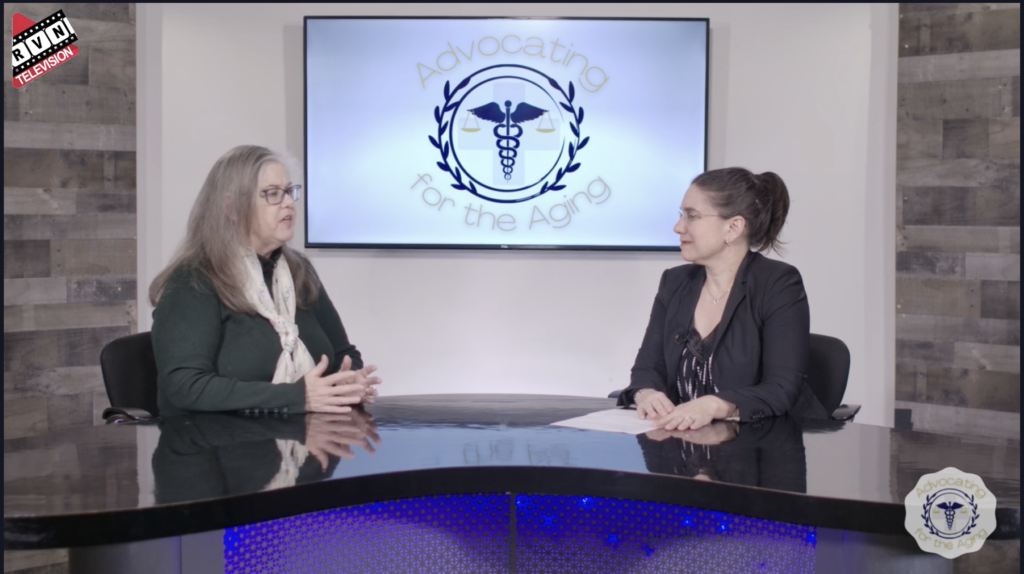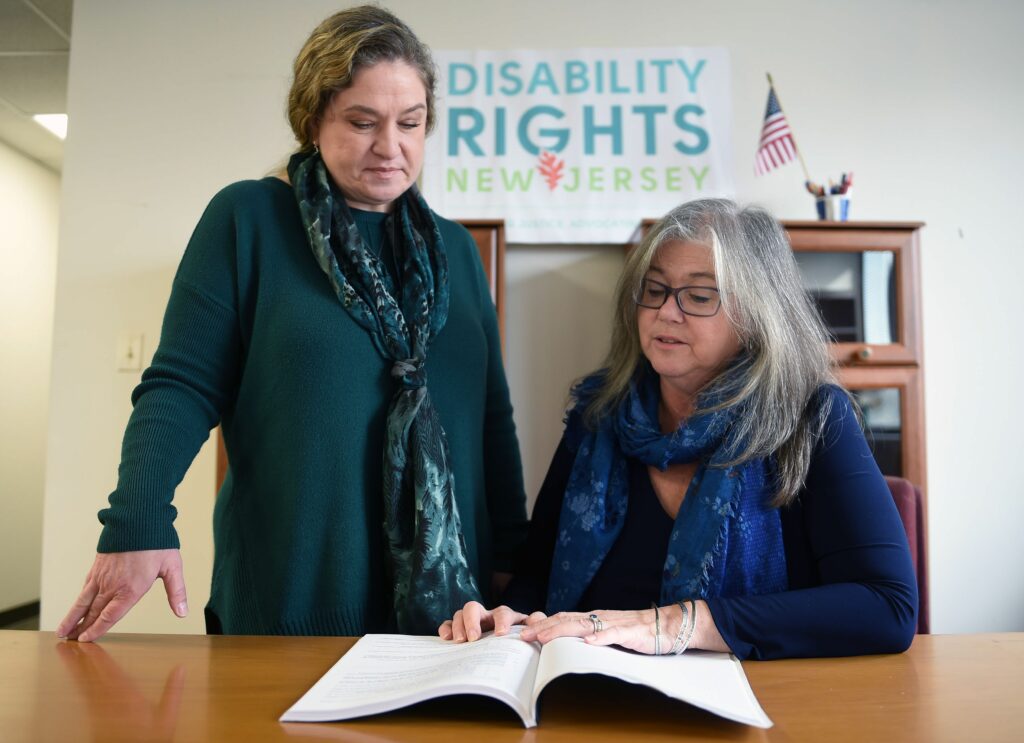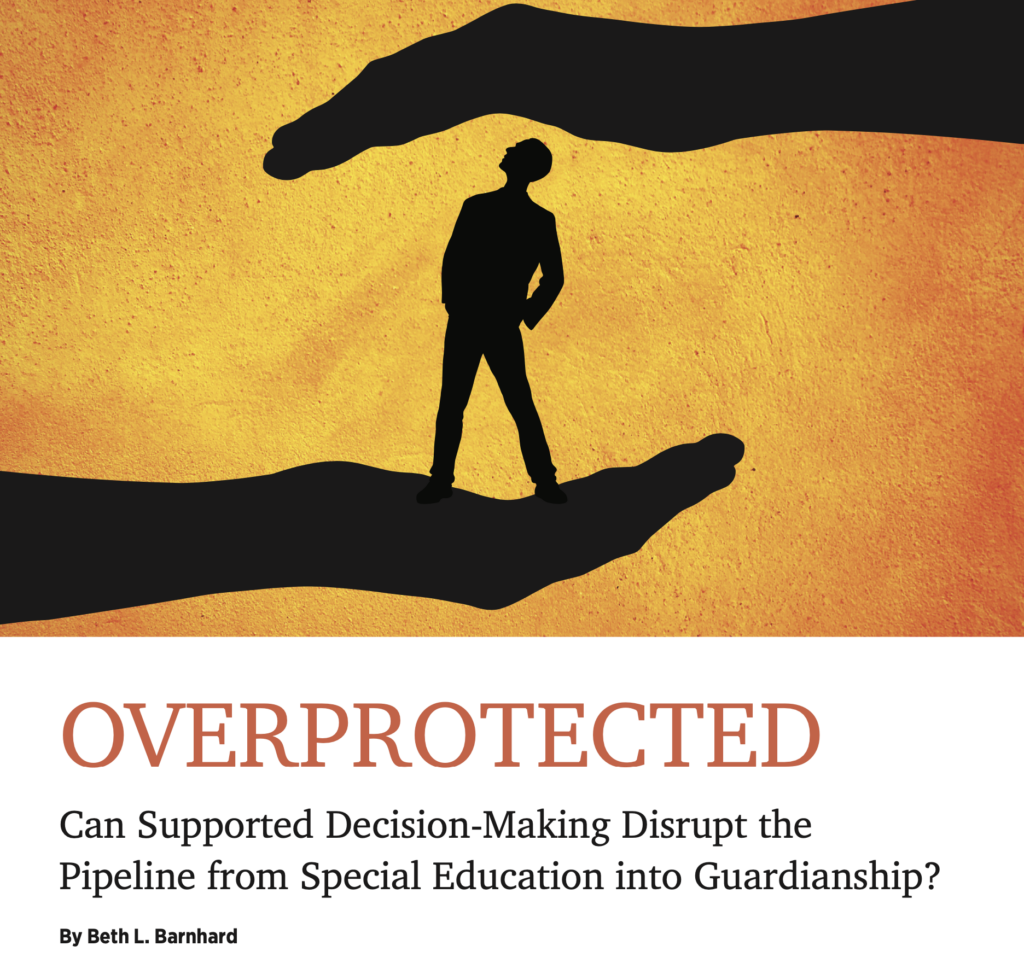Sharing Our Expertise
October 18, 2024
Investigation of abuse, neglect at youth detention center can proceed
Bobby Brier | NJ Spotlight News
“A federal judge is allowing a statewide nonprofit to proceed with its investigation into allegations of abuse and neglect at New Jersey’s largest youth detention center after it was denied full access to the facility.
Last week, Jamel K. Semper, a U.S. District Judge for the District of New Jersey, granted Disability Rights New Jersey’s motion to enforce its right under federal law to investigate allegations of abuse and neglect at Essex County Juvenile Detention Center, according to a news release from Disability Rights New Jersey.”
September 23, 2024
Disability rights at center of guardianship court case
Joanna Gagis | NJ Spotlight News
Disability Rights New Jersey Staff Attorney, Kelly McGuire, along with our client Peter Brumlik are featured in NJ Spotlight News piece about his fight to overturn guardianship conditions placed upon him by the court, after they dismissed his mother’s petition to maintain guardianship of her now 21-year-old son.
A petition for guardianship over Peter Brumlik who has autism, filed by his mother before he turned 18, alleged he was unable to care for himself and lacked the capacity to make major life decisions.
Brumlik, now 21 years old, has spent the last three years fighting his mother’s claim. Kelly McGuire, a staff attorney for Disability Rights New Jersey, argued against those conditions on behalf of Brumlik in appellate court earlier this month. Disability Rights New Jersey got involved in Brumlik’s case because of the unusual way that the court handled the dismissal.
July 30, 2024
DOE finds Trenton School District did not comply with certain disability regulations
Joanna Gagis | NJ Spotlight News
Following a complaint by Disability Rights New Jersey, the state Department of Education opened an investigation into the Trenton School District and found it was not compliant with state regulations or the Individuals with Disabilities Education Act. The Education Department is now requiring the district to create a corrective action plan.
The complaint was that Trenton School District had failed to reenroll youth coming back from out-of-home placements.
“A number of students who were in out-of-home placements, primarily in youth detention centers, but also students returning from other facilities where they may have sought mental health treatment, were having trouble getting back into the Trenton public schools,” said Lisa Quartarolo, managing attorney with the Youth Practice Group, for Disability Rights New Jersey. “Enrollment is supposed to be immediate so once the parent completed the online enrollment form or went to the board of education offices and enrolled their child, that student should have been placed in school immediately.”
May 20, 2024
What NJ is doing to improve nursing home care
Lilo H. Stainton, NJ Spotlight News
State task force commends some reforms but reiterates concerns about long-standing problems.
The reforms also align with recommendations from the latest assessment released earlier this month by the state’s Task Force on Long-Term Care Quality and Safety. A state-appointed advisory body, it was established in 2020 following a consultant’s report that raised multiple concerns about the industry’s ability to safely provide for patients — and the state’s capacity to monitor this work. More than 9,000 nursing home residents died during the pandemic, that assessment noted, roughly one-quarter of all COVID-19-related deaths in New Jersey.
The task force commended New Jersey officials for some ongoing reforms but said the “COVID-19 crisis laid bare the need to reimagine and fundamentally transform” the way the state funds and regulates services for people who are elderly, disabled or otherwise need assistance. The state’s policies continue to favor institutional or nursing home care, the group said, instead of services to help residents remain at home or live within the community in small group homes with some staff — options preferred by 8 in 10 people, experts note.
April 10, 2024
Committable Podcast: State by State: New Jersey
In this episode we interview Ami Kachalia from ACLU of New Jersey and Bren Pramanik from Disability Rights New Jersey about mental health laws in New Jersey.
Episode Transcript: sensiblenonsense.squarespace.com/committables3-transcripts/2024/5/21/s3-new-jersey

February 22, 2024
Suit blasts 4 state psychiatric hospitals for violent conditions, ‘unconstitutional’ policies
Colleen Odea | NJ Spotlight News
In federal lawsuit, disability rights advocates in NJ argue refusing to discharge patients cleared for release violates their due-process rights.
A stay in a New Jersey state psychiatric hospital “is more akin to psychiatric incarceration,” including violence and difficulty just getting just a drink of water.
So asserts a highly critical federal lawsuit filed this week by the organization that advocates for New Jerseyans with mental illness. The 99-page lawsuit, filed in federal court by Disability Rights New Jersey, alleges the constitutional due-process rights of many patients in the four state psychiatric hospitals are being violated.
People are being kept involuntarily in the facilities as in-patients, according to the complaint, even when they have been approved for release because there are not enough community placements for them.
The suit contends that some people are forced to wait months, if not years, for release. When they are released, it is often to an inappropriate placement just to get out of a hospital, rather than wait longer for the placement of their choice.
“The conditions in our state psychiatric hospitals would not be tolerated in any other healthcare setting,” said Jill Hoegel, director of investigations and monitoring at Disability Rights New Jersey, which is the designated protection and advocacy group for people with disabilities.
“Nobody expects to be assaulted when they go to the emergency room with a broken leg, and the same should be true for New Jerseyans involuntarily committed to receive inpatient mental health care,” she said. “The commissioners have allowed these conditions to persist for too long, despite reports, investigations, and even lawsuits filed by patients over the past several years.”
N.J. psychiatric hospitals are like prisons that put patients in danger every day, lawsuit says
Sue Livio / NJ.com
An advocacy group for people with disabilities sued the Murphy Administration Tuesday for running the state’s public psychiatric hospitals like prisons, where patients have been sexually and physically assaulted, deprived of basic necessities like water and kept months — and even years — beyond their discharge date.
Disability Rights New Jersey, a federally funded advocacy organization, described grim conditions for many of the 1,150 patients at the Ancora Psychiatric Hospital in Winslow, Greystone Park Psychiatric Hospital in Parsippany, Trenton Psychiatric Hospital and Ann Klein Forensic Center in Trenton and Ewing.
“The reality on the ground is more akin to psychiatric incarceration,” the 99-page federal lawsuit said.
Countless patients have told Disability Rights New Jersey “I don’t feel safe here,” according to the lawsuit, which names the commissioners of the departments of Health and Human Services as defendants because together they oversee licensing, inspections and operations.
“The conditions in our state psychiatric hospitals would not be tolerated in any other healthcare setting. Nobody expects to be assaulted when they go to the emergency room with a broken leg, and the same should be true for New Jerseyans involuntarily committed to receive inpatient mental health care,” said Jill Hoegel, Disability Rights New Jersey’s Director of Investigations and Monitoring. “The commissioners have allowed these conditions to persist for too long, despite reports, investigations, and even lawsuits filed by patients over the past several years.”
October 31, 2023
Blind voters say they’re still disenfranchised in NJ. But a new bill has given them hope
Gene Myers | NorthJersey.com
Despite years of activism, blind and partially sighted voters in New Jersey still can’t exercise their right to cast ballots privately and independently, the community says.
That may finally change thanks to a push in the state Legislature.
For years, those with vision loss have had two options, both flawed: They can fill out a ballot at home — but only by printing and signing forms. Or they can head to the polls, where transportation, balky assistive devices and unprepared election workers all pose problems. There’s been some progress, with many counties installing voting machines with new assistive features last year. But the technology is still imperfect, requiring blind voters to get help and violating the promise of a secret ballot.
Advocates for those with blindness or low vision say that still leaves roadblocks in their way.
Too often, poll workers either don’t know how to set up the audio component or “don’t want to bother with it,” said Mary Ciccone, director of policy at the group Disability Rights New Jersey. “Many individuals don’t want to wait around for who knows how long to get someone from the county to fix the machine or get it set up.”
Most of the new machines also make use of an optical scanner that requires voters to check printouts of ballots after selections have been made. People with vision loss can’t verify their intentions were accurately recorded, she Ciccone said.
October 17, 2023
26% Of Nursing Home Residents In New Hersey Have I/DD, Five Percentage Points Higher Than National Average
The percentage of New Jersey residents with intellectual/developmental disability (I/DD) who live in nursing homes was five percentage points higher than the national average, at 26.07% to 21.32% from the first quarter of 2020 to the third quarter of 2022. New Jersey’s average was higher than the national average in every quarter. The number of residents with I/DD living in a nursing home is likely undercounted, according to Disability Rights New Jersey, because the state has not collected and maintained complete, consistent, and accurate data on this population.
During the first six months of 2023, state-generated PASRR data suggested that 335 individuals with I/DD were admitted to a nursing home, and none of those individuals needed specialized services. Between 2019 and 2022, New Jersey nursing homes reported Federally that over 2,000 residents had I/DD or a related condition.
Each year between 2019 and 2022, state-generated PASRR data suggested that between 250 and 600 residents with I/DD were admitted to nursing homes each year. However, during the same time period, nursing homes reported having over 2,000 residents with I/DD) annually…
October 17, 2023
Voters with disabilities have expanding options in NJ: Here’s how to find help
Gene Meyers / NorthJersey.com
While voting has been made easier through the years thanks to mail-in ballots, screen readers and polling places with accessible entrances and parking, there’s still at least one group that says it has been left behind: New Jersey residents with impaired vision are denied the right to vote privately and independently, said Mary Ciccone, director of policy at the advocacy group Disability Rights New Jersey.
October 3, 2023
People with disabilities improperly placed in nursing homes, report says
Brianna Vannozi | NJ Spotlight News
Disability Rights New Jersey, the state’s protection and advocacy system for people with disabilities, recently released the results of an investigation into nursing homes during the COVID-19 pandemic. The report highlights that among those living in nursing homes who died from COVID-19 were a large number of people with intellectual and developmental disabilities — people, Disability Rights New Jersey argues, shouldn’t have been there in the first place.
“These are institutions, these are hospital-like settings, and a lot of them are really dismal,” Bren Pramanik, the managing attorney for the organization, said in an interview with NJ Spotlight News.
“The state has to know who these people are, where they are, and they really have to know what these people want and need in their lives,” said Gwen Orlowski, the executive director of Disability Rights New Jersey.

October 3, 2023
N.J. wrongly forces people with developmental disabilities into nursing homes, scathing report says
Susan K. Livio | NJ Advance Media for NJ.com
At least 2,000 people with developmental disabilities in New Jersey are housed in nursing homes “contrary to their wishes” and in violation of their constitutional rights because the state does not properly evaluate their needs or give them the option of living more independently in a group home, a new report has found.
The state Department of Human Services has allowed this problem to fester partly because it doesn’t keep track of how many people with developmental and intellectual disabilities actually live in nursing homes, the legal advocacy group Disability Rights New Jersey wrote. Its critical 101-page report, released Monday, is based on interviews with hundreds of residents from 70 nursing home and their guardians.
October 2, 2023
Hundreds with disabilities in NJ are forced into nursing homes, new report says
Gene Myers | NorthJersey.com
Hundreds of people with intellectual and developmental disabilities have been forced into nursing homes that lack the proper oversight or resources to care for them, a group of New Jersey advocates said in a report released Monday.
Disability Rights New Jersey warned that people with behavioral disorders, cerebral palsy, Down syndrome and other conditions are too often sent to nursing homes when group homes claim they can no longer accommodate them, or when home care becomes too challenging for elderly parents.
The group urged the state to better track such patients and to beef up monitoring of nursing homes where they may be housed. Those facilities were the site of an estimated 10,000 deaths in New Jersey during the COVID pandemic, and disability advocates said they’re often poorly prepared to care for those with complex disabilities.
March 29, 2023
Disability Rights New Jersey at the White House to talk about opportunities for New Jerseyans with disabilities
Gwen Orlowski, Executive Director of Disability Rights New Jersey attended President Biden’s “Communities in Action: Building a Better New Jersey“ event at the White House where several members of his advisory council spoke to guests including Susan Rice – Director of Domestic Policy, Polly Trottenberg – Deputy Secretary of Transportation, Don Graves – Deputy Secretary of Commerce, and Gene Sperling – Coordinator of the American Rescue Plan.
Stakeholders from agencies around the state met with to share the local impact and progress we have made leading our communities towards creating opportunities and positive action for New Jerseyans with disabilities.

March 23, 2023
Woman trapped in guardianship for 3 years finally has her rights restored after KIYC investigation
Walt Kane, News 12 New Jersey
A woman featured in a series of Kane In Your Corner investigations after she was trapped in a guardianship against her will, has finally gotten her rights restored. But the ordeal lasted three years and cost her an estimated $200,000…
“The guardianship system definitely has a tilt towards getting people into guardianships and it can be very, very difficult for those folks to get restored back to capacity,” says Michael Brower, legal director of Disability Rights New Jersey. Brower says he attributes that in part to judges feeling concerned they could be publicly blamed if a person they rule has capacity is later injured. By contrast, Brower says some judges feel confiscating a person’s rights is the safer choice, even if it leaves them miserable and unable to exercise any control over their own lives. A bill, which would require judges to impose the least restrictive guardianship possible, has been languishing in Trenton for several years.
December 18, 2022
Advocating for the Aging with host Victoria Schall, Esq. and guest Gwen Orlowski.

December 18, 2022
‘Somebody should care about these patients…’
It was called one of the worst nursing homes in N.J, Why did it take so long to shut it down?
Susan K. Livio, NJ Advance Media and Ted Sherman, NJ Advance Media
In the face of the heightened attention and unwelcome publicity that had come after the discovery of the unclaimed bodies, Andover Subacute II changed its name in June 2021 to Woodland Behavioral and Nursing Center. But the story of the makeshift morgue resonated powerfully with Gwen Orlowski, executive director for Disability Rights New Jersey, a federally funded legal group that advocates for the human, civil, and legal rights of those with disabilities.
She found the number of individuals with developmental disabilities, serious mental illness and traumatic brain injuries who were dying at Andover “really staggering.”
By the summer of 2021, Disability Rights New Jersey resumed making in-person visits to nursing homes, including the now renamed Woodland Behavioral and Nursing Center. Jill Hoegel, the group’s director of investigations and monitoring, said on their first trip back, concerns were growing about the number of people there with disabilities — the largest number ever with serious mental illness, intellectual disabilities, and traumatic brain injuries.
“That was a red flag for us. They didn’t appear taken care of,” she said. “People were dirty, disoriented and seemed over-medicated. They were not coherent and shuffling around. Nobody was going outside and nobody was able to leave. They had been imprisoned inside.”

December 2022 Issue – New Jersey Lawyer Magazine, NJ Bar Association
“Overprotected” written by Beth Barnard, DRNJ Board Member

New Jersey has long acknowledged that a guardianship is a “drastic restraint on a person’s liberty,” and has encouraged limited guardianships and other arrangements that promote personal autonomy for individuals with ID/DD. Stripping a person with disabilities of their rights and substituting a third party as decision-maker is not intended to be perfunctory, yet the way the special education system is structured, guardianship has become almost a rite of passage of turning 18.
August 3, 2022
Few remain at state’s most troubled nursing home
Lilo Stainton, NJ Spotlight News
Nearly 340 residents — a mix of elderly and younger people, many poor and disabled by brain injuries, addiction or other conditions — have already been resettled to other New Jersey long-term care facilities.
That is no surprise to Michael Brower, legal director for Disability Rights New Jersey, an advocacy group that has been tracking the process at the Sussex County facility closely. The group has pushed state officials and care managers to ensure they are respecting Woodland residents’ wishes and identifying housing options in the community, if appropriate.
“We saw that trend coming, we were a little concerned about it,” Brower said. “We don’t want people to be re-warehoused and moved from one problematic nursing home to another maybe less-problematic nursing home, but then forgotten about.”
Brower said state officials and care managers with the insurance companies that provide the Medicaid plans have pledged to continue working with residents resettled from Woodland to ensure they are in the right home environment, with as few restrictions as possible. “We want to make sure that actually happens.”
June 2, 2022
Deadline looms to move nursing home residents
Lilo Stainton, NJ Spotlight News
What this means for Woodland’s residents is the primary concern for advocates like Disability Rights New Jersey, which has been tracking the nursing home’s operation for several years. The organization’s staff said it is particularly concerned about the nearly 200 residents with serious mental health issues, traumatic brain injuries or other disabilities, who are kept in a locked, third-floor unit.
“The burning question is, this is a really short timeframe and there are a lot of people there and there’s going to be a lot of work to get done if the intention is for the facility to close,” said Michael Brower, DRNJ’s legal director. A dedicated team of case managers is needed to meet with each resident to discuss their wishes and options, assess what other housing is appropriate and plan the actual move, he explained.
May 26, 2022
NJ moves to seize control of troubled nursing home
Lilo Stainton, NJ Spotlight News
Michael Brower, the legal director for Disability Rights New Jersey, said his team will be following this transfer process closely. The nonprofit organization, legally designated as an advocate for New Jerseyans with disabilities, has been monitoring activity at Woodland for several years and launched a formal investigation this winter. The disability rights organization is particularly concerned about the nearly 200 residents of a locked third-floor unit who have mental health issues, traumatic brain injuries or other disabilities, Brower said, and who have specific needs that few programs can meet. He is also watching to make sure residents who don’t want to move aren’t forced out prematurely.
“One of the problems is there aren’t a lot of options for people who need intense support and services,” Brower said. Some of these residents may not require nursing-home level care, he said, but have been warehoused at Woodland for lack of better options, like group homes or independent, but supported, life in an apartment. “I don’t know if there’s a great amount of community capacity out there,” he said. “That’s going to be very difficult for the transfers.”
April 5, 2022
‘We weren’t loud enough’: Howell parents preach advocacy after death of son with autism
Jerry Carino, Asbury Park Press
Be an aggressive, firm advocate for your disabled child, particularly for disabled adults,” dad Glenn Cantor said. “You really have to work and be insistent. If they can’t speak for themselves, they need people to speak for them.”
The did not know, until it was too late, how to most effectively voice their concerns about Danny’s health to New Jersey’s Division of Developmental Disabilities.
“The DDD system, the checks and balances, is actually pretty robust,” said Jill Hoegel, Director of Investigations and Monitoring at Disability Rights New Jersey, the state’s designated protection and advocacy agency under federal law.
March 11, 2022
Judge grants disability advocates access to NJ nursing home residents to investigate abuse, neglect
Susan K. Livio, NJ Advance Media for NJ.com
Ted Sherman, NJ Advance Media for NJ.com
Based on the health department’s findings, “Disability Rights NJ determined there was probable cause to suspect that all residents at Woodland have been subject to ongoing abuse, neglect, and rights violations,” according to Tuesday’s court filing.
After repeated visits, Disability Rights Executive Director Gwen Orlowski concluded the third floor of the Woodland facility operates like an “unlicensed psychiatric hospital,” where nearly 200 residents with mental illness and developmental disabilities live on a locked floor.
March 10, 2022
Advocates were berated, bullied when they tried to investigate alleged nursing home abuse, says lawsuit
Susan K. Livio, NJ Advance Media for NJ.com
Ted Sherman, NJ Advance Media for NJ.com
Disability Rights has been sending staff periodically to Woodland since Easter weekend in April 2020, after police discovered a makeshift morgue overflowing with the bodies of residents who had died from COVID-19, according to the lawsuit, filed jointly by the Dann Law Firm in North Brunswick.
The nonprofit agency renewed its efforts after the Health Department’s recent inspection revealed “detailed instances of abuse and neglect.” The state found no efforts had been made to resuscitate or even call 911 for a 55-year-old resident whose heart stopped on New Year’s Day. One aide left a resident with bed sores to lie in feces overnight, and faced no discipline, according to the inspection report obtained by NJ Advance Media.
Orlowski said her team believes many residents on the third floor do not require nursing home care but wound up there because there is a shortage of supervised apartments or other community housing options for people with mental illness and developmental disabilities. She has asked the Murphy administration to intervene while Disability Rights conducts its investigation.
April 29, 2021
Preventing Online Sexual Victimization of People with Developmental Disabilities
All people, including people with intellectual and developmental disabilities (IDD), are sexual beings and often seek close, intimate relationships. People with IDD have a right to good sexual health and well-being, and this right extends to their online community. While access to the internet and social media can open up the possibilities of having an extended community and potentially larger circle of support, there’s also concern about how easily victimization can happen too.
We already know that people in the IDD community experience sexual violence at higher rates than the general population. One article cites data from the Bureau of Justice Statistics that found people with intellectual disabilities experience sexual violence at seven times the rate of those without disabilities. Another data source reveals that 60% of people with IDD who are in romantic relationships have experienced interpersonal violence or abuse, and 40% of them did not seek assistance.
April 17, 2021
NJ’s lockdown on programs for disabled people must end now, families say.
Aided by vaccines, mandatory mask-wearing and social distancing, the Murphy administration this year has gradually relaxed restrictions on nursing homes visits, attendance at weddings and sporting events and dining capacity at restaurants.
But there is one segment of the population that is still waiting for a reprieve from the pandemic-driven lockdown: the 12,000 people who live with developmental and intellectual disabilities who used to spend as many as 40 hours a week learning and socializing with their peers at what are called day programs.
Gwen Orlowski, executive director for Disability Rights New Jersey, a federally funded legal advocacy group, said Friday many families have contacted her organization seeking help. Disability Rights agrees families have a valid point. “We recognize that there are public health concerns to reopening day programs, and we also recognize that the continued closure of congregate day programming is taking a toll on (those) who need those services and their families or caretakers who are trying to fill the gaps during the pandemic,” Orlowski said.
